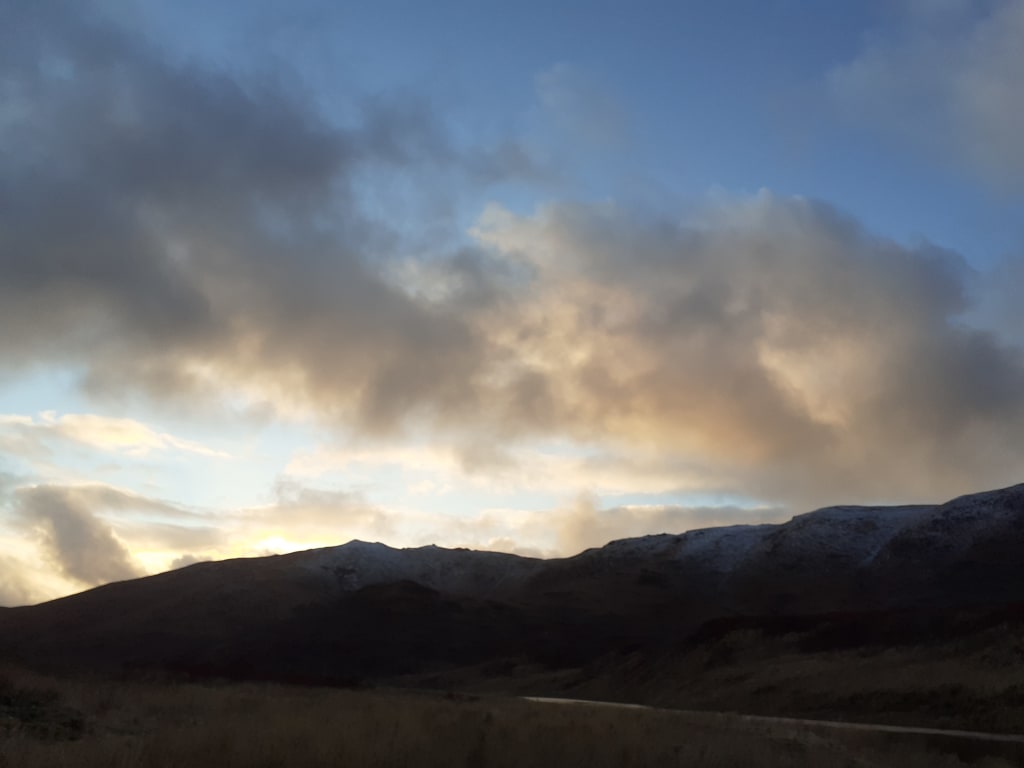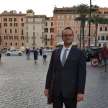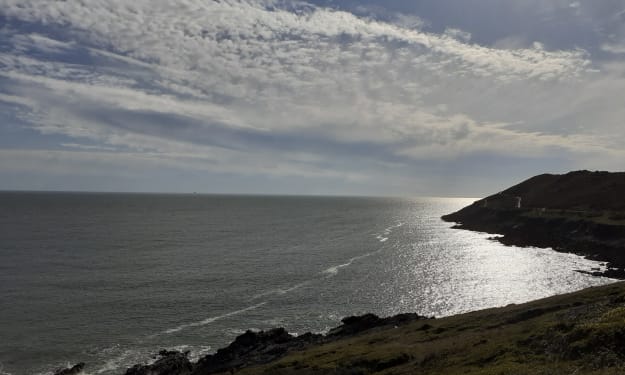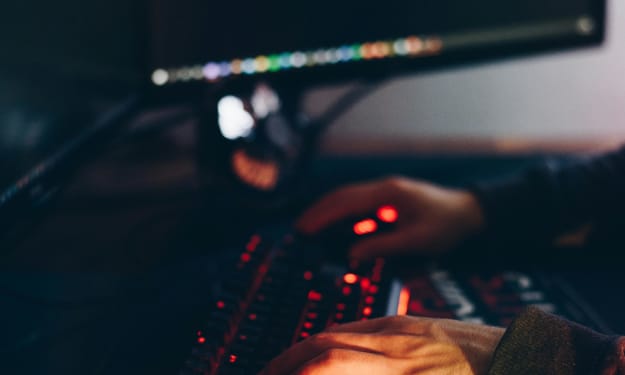An Unexceptional Miracle
sometimes the miraculously ordinary is the seed of something extraordinary

When the storm started, I was in the old barn with my brother smoking a cigarette. The cigarette paper was the back page of a pocket bible I had found in dad's crumpled pile of trousers. The smoke was corn-silk, mint, and rose petals from mom's garden. Tobacco was going extinct — one of the first species targeted by for eradication. Corn and roses were doomed as well, though they were not targeted, at least initially. Scientists predicted that mint might fare better, and I wonder sometimes if it was rescued like the rest of us.
The barn was hammered together from graying sun-bleached planks. Warm humid air streamed through the gaps between every wall panel and floorboard. All the animals were gone but the smell of horse manure and dusty alfalfa pronounced itself. Outside the barn, the trees: cottonwoods, birch, pine, they all swayed vigorously as the storm picked up momentum.
"It is just rain! What is rain but water from the sky?" Someone on television may have said. But, the sticky stuff that fell upon the few remaining forests and vast deserts that summer was not only rain.
We all heard the drones inspecting homes at night or humming their way along the roads and sidewalks as they followed the few remaining workers from workplace to home and back again. We never saw their whirring features, just a spherical blur as they wrested themselves from our vision with every attempted glance. They slept in massive bruise-colored clouds that were burgeoning and expanding from the coastlines.
Their rain came from their clouds, just like it came from Earth’s own pure variety in preceding eons. When a blob of rain pelted the toe of my boot, I watched it coalesce into a sphere and remain pooled in a crease of leather. My brother and I were standing at the edge of a window on the top floor of the old barn. The window was also a door for bales of hay to enter via pulley and looked out over a gravel rectangle where our two cars waited.
"Never rains in July." I said to my brother.
"It's not rain." He said as he kicked my boot and the liquid droplet which had deposited there toppled to the gravel below. He handed me the end of the cigarette and I held it out in front of me where another droplet struck its ember and hissed. I dropped the wet speck of smoldering paper to join its predecessors in the cigarette boneyard below.
“Happy birthday big bro!” Little brother had stepped back into the shadows of the barn where he fished something from his jacket pocket. He held out a white envelope emblazoned with my name: Wilbur.
“Bro, I thought we didn’t have they money…” I snatched the envelope, hoping it contained enough cash to forestall the authority’s foreclosure on our dead parents’ home. It did not.
“There is no more money. Open it.” Already disappointed, I followed his instructions and peeled the paper flap open to peer inside the envelope.
Inside there was a smattering of sandy brown seeds, some clinging wet to the paper. Tobacco seeds.
“Where on earth did you get these?” I stammered.
“Internet bro.” He wrinkled his forehead and raised an eyebrow at me.
I smelled the dusty, soggy envelope and folded it up to store in my own jacket pocket.
“Wow. But do you think they will work?”
“Only one way to know!” And we both smiled and nodded.
We spent the night pilfering wine that mom kept hidden in the back of the pantry. What we talked about were only rumors then. That the drone swarms for the Global Life Census were self-replicating, that they were no longer commanded by the Central Intelligence Authority. They were wild things now, like the plants and animals that they measured and analyzed. My brother insisted the rain outside carried little water wrapped mechanical bugs that scurried and burrowed and learned and listened. I thought it was bullshit and told him as much.
In the morning, we each pinched a few seeds from the envelope and sprinkled them into some good soil that we had packed into cracked terracotta flowerpots from the garden shed.
“I guess this is the last time we will be here at home together.” Little brother said and I replied with a solemn nod.
That afternoon, we organized mom and dad’s belongings. Ultimately, there were three large cardboard boxes. The first box, which once contained a microwave oven, now contained stacked picture frames and knickknacks gathered from around the house. The second box, which once contained shiny new kitchen pots and pans, now contained smudgy keepsake cooking books and travel guides. The third box was brown and broken but contained only a few clothing items: dad’s sweat stained shirts; mom’s floral dresses and her big floppy sunhat.
We emptied the picture frames for abandonment and split up the memories they contained, one by one. I took a picture of us four: mom, dad, brothers, standing on the edge of a pier each holding a dead fish. He took a picture of us as toddlers with matching soccer jerseys — smiling and hugging grandpa after winning the game. It went on like this for several hours as we reminisced aimlessly. We decided to deposit the rest of the stuff at my place — maybe when one of us finally had kids they would like to see and touch these things. We each put one of the terracotta pots on the front passenger seat of our car and turned to say to goodbye.
“Same time next year?” I asked.
“Yep. Maybe you can come out to Grand Mesa?”
“I’d like that.” Anywhere dry, anywhere away from the clouds and rain sounded good.
“We don’t get big storms there, not yet.” He sounded anxious. It was only a matter of time before the occasional chaotic flurry of precipitation would be replaced by the persistent mechanical version that rehearsed along the coastlines.
“Be safe brother!” Were the last words I said to him.
The trip back to Seatown from Cheyenne took me twenty hours driving without computer assistance. I enjoyed the autonomy of piloting my own vehicle — this was allowed on rural roads where traffic was sparse, and the risks minimal. I stopped at Salt City to get some clean water for the nascent seedlings and I, but after some fry bread and a pot of black beans with chilis and onions in Yakima I was too tired to continue driving.
The percussive thud of rain on the roof and hood of the car woke me. Make a circle with your thumb and forefinger, that is how big the balls of water were.
Although alarmed at the size of the falling globules of water, I had to pee, so I stepped into the downpour that had engulfed the environment. The asphalt was smeared with desert mud and a pond was forming around my car. The sun peeked around the edge of the storm shroud and I saluted its presence and hummed the tune to Itsy Bitsy Spider.
I reentered the car soaking wet and took dad’s pocket bible from where it sat beside the terracotta planter. I flipped to the back where I had torn pages for the cigarettes that I had shared with my brother. My father was not a religious man, no one in our family was, but when the authorities banned cigarette rolling papers as illegal contraband his ingenuity reminded him of the way the pages in these little bibles felt. The paper was thin and soft and slightly transparent. The words were placed with cheap ink that smudged like newspaper print and I could see the circles from the skin of dad’s thumb pressed into the corner of a page. I tore this page loose and fished in my pocket for the little plastic bag I had filled with the herbal blend that served as my ceremonial tobacco.
I cracked the car window to let the smoke out and tiny droplets of splattering water in. The soil in the terracotta planter looked dry and after the final line of scripture pressed between my fingers was annihilated, I whisked the thirsty seeds outside and into the rain. I shielded the surface of the soil with my hands to protect the seeds from any direct strikes and it took only moments for the dirt to saturate and for tannin-stained water to trickle from beneath the pot.
I was staring at a billboard that read: “Never hurry and never worry!” with a picture of a woman touching her wrist where she had her transportation credentials implanted, when I noticed the humming directly behind my head. The low-pitched whining and buzzing sounds reminded me of the electrical fuse box in the basement of my apartment building. I knew from experience it was a census drone staring at me and my agricultural endeavor.
I tried to turn and face the haunting thing, but it shot into the dark swirling clouds above in an instant and I was alone with my garden once more.
“Damned things.” The air smelled like ozone now, whether from the storm or the machine that had zipped away, perhaps both.
Returning to the car, I settled the wet pot of soil on the backseat floor and resolved to drive the rest of the way home non-stop.
Seatown, the city center, was blanketed in dark clouds that whirled and pulsed like great intermingling schools of fish.
The basement fuse box was moaning next to where I parked my car and I gave it a cursory nod as it were a friendly neighbor.
When I opened the backdoor to the car, my eyes were met with the green glare of leaves protruding from the soil.
“Hallelujah!” I exclaimed and knelt to inspect the plants that were emerging.
“Honey!” I blared as I entered my apartment, signaling for my wife to hurry and see the miracle.
“Salutations Citizen.” The words that met me were not my wife’s but that of the Administrator who sat in my chair beside the television. The voice that carried the words travelled through a modulator to eliminate discernable semblances of age, gender, any measurement of what defines an individual person. The face of the Administrator was shrouded beneath a gray mesh hood and its hands were covered in black leather gloves. It was wearing a charcoal gray suit, white shirt and gray tie. The black shoes that the Administrator wore shone like the bubbles of tar that swallowed up the mastodons and sabretooth tigers.
“We have been watching you today.” The modulated voice offered no emotional bearing, there was no hint of disappointment or animosity that might accompany a similar accusation from a police detective.
I dropped the terracotta pot to shatter as I turned to run. Through the open door of the apartment, I could see the shadows of two additional administrators approaching from opposite directions in the hallway. I froze and listened as the Administrator continued to explain my situation:
“Possession of contraband is a strict liability offence which carries mandatory enforcement of your incarceration and reeducation.” I could still hear the Administrator’s voice, but it was no longer in my ears, it was inside my mind.
“Resisting enrollment in the University correctional system carries mandatory punitive measures during incarceration and restrictions during reeducation. Your continued malfeasance will only make your recovery more difficult.”
It was the rain my brother warned me to avoid, the rain that soaked into my clothes, and into my skin. It was the nano-bots that the rain carried and spread across every surface of every object in every corner of every land. I was already, long since, imprisoned.
The Administrators escorted me to the car that would take me to the next chapter of my life at University Correctional Center. Locked inside their vehicle, I whispered to my reflection in the car window: “Be safe brother.”
About the Creator
Cean Mills
Aspiring Seattle fiction writer, plaintiffs attorney, and maritime lawyer. Expert soup, salad, sandwich maker. Formerly a professor of law in Lebanon. Formerly a wildlife researcher in Alaska. World citizen. Uberrimae Fidei






Comments
There are no comments for this story
Be the first to respond and start the conversation.